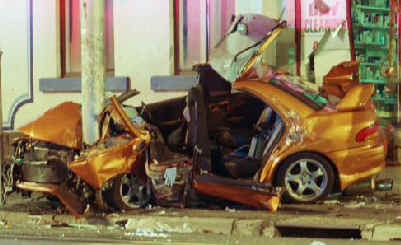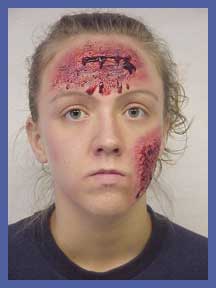Chapter 30: RISK TAKING
OPTIMISM BIAS (THE PSYCHOLOGY OF DRIVERS):
(Based on presentations delivered by Associate Professor Soames Job of the University of Sydney, Psychology Department)
Humans are very illogical animals (apparently we are the descendants of the mal-adjusted monkeys that couldn’t function in the structured ordered world of monkeys and were cast out of the trees and mountains). As such we had to quickly evolve to walk upright, use weapons to defend ourselves and become more intelligent. But our illogical behaviour trait remained.
Humans are highly optimistic about our lives, our successes and our skills. If you were to interview a group of people about their chances of dying from different diseases (including diseases that you made up and people then had no idea about how contagious they were) the people would say their risk was very low on all accounts. Likewise if you interviewed people and asked them to rank their ability as a driver, they would tend to say above average (in fact above average would be the average result). People are very optimistic. This is called "optimism bias". The only people who aren’t optimistic are the manic depressed.
Therefore typical advanced driving courses that build skills create a belief of greater driving ability and superiority over other drivers. The same applies though the safer cars and safer roads, people perceive less risk in safe cars, driving on safe roads and therefore drive more dangerously.
If training increases someone's perceived level of skill they will be more optimistic about their safety and their superiority over other drivers. This is bad. Therefore by making someone think they are better than other drivers is detrimental to their safety.
Likewise by showing the faults and the deficiencies in other drivers, we would also reinforce the belief that other drivers are to blame for crashes. For example by watching TV shows like the "Worlds Worst Drivers" or "Learners Permit" we see examples of all the other idiots which just reinforces our over-optimistic opinion in ourselves.
Associate Professor Soames Job suggests driver training that starts early and can reduce optimism before driving skills develop fully can be very beneficial.
Many of the graphic road safety ads run in NSW and VIC are ineffective and probably counter to road safety because people switch off to the blood and guts and don’t associate themselves with the victims. Research has shown the majority of drivers after watching these ads and asked for there response, say things like "It is so great you are showing THEM how to drive safely". The them being everyone else. These TV ads just reinforce the "it won’t happen to me" syndrome and the belief that everyone else is to blame for the road toll because I am already a good driver.
RISK TAKING
Our attitude and what motivates us as a driver is the key to managing the risks we take when driving.
For example speed and what motivates drivers to speed is an area that can increase the risk of having a crash.
Trying to drive at 25 kph faster than the surrounding traffic increases your risk of a crash by 10 times. One day another driver will misjudge the speed and distance of your approach and leave you with no where to go.
Those doing the dance of death at high speed through a roundabout late at night will have fun until the night they misjudge clip a kerb and meet a power pole face to face.
The driver and passengers seeing how fast their car can go may wish they were at home when the underinflated tyre explodes and says sorry make your own arrangements from here.
The driver speeding down a side street to get ahead in traffic may blame the child they run over for riding their bike in what was normally a quiet suburban street. But we know who is really to blame.
A speeding driver at night may get a kangaroo as a bonnet emblem because their stopping distance exceeded the range of their headlights.
Its all about what motivates us to drive like we do.
Lets use the game of golf as an analogy of peoples attitudes to driving.
THE GOLF ANALOGY
As a golfer, I am a hacker. I realize that being able to hit a golf ball from tee to green doesn’t make me a professional.
A professional golfer though could teach me to improve my swing and hit the ball further. But these skills alone might not lower my handicap, they won’t stop me hit the ball into hazards. In fact I could get into more trouble. Having a long drive, being able to tackle hard, having a fast serve do not in isolation make a great sportsperson. Likewise being able to drive a car fast does not make a good driver, nor does just having good car control skills.
When it comes to driving there are no professionals to aspire to.
A novice racing driver might aspire to be like a Formula One Champion. But a racing driver is not necessarily the most accurate a role model for driving on the road. In fact statistically racing drivers crash more often on the road. A truck driver might be a professional driver, in that driving is their profession but they might not be good at it.
So what makes a good driver. I have heard over many years people telling me that they have been driving for 20, 30, 40 years that makes them a good drivers. Well experience and wisdom help but experience is not always the best of teachers.
Other have said they have a licence that makes them a good driver. The problem here is general a licence requires drivers to reach a minimum basic standard but nothing else.
Having never had a crash is also commonly quoted as the reason someone is a good driver. Maybe this was more luck than talent.
SCHOOLIES WEEK:
22,000 HOURS OF SCHOOL WASTED IN 2 SECONDS
The average 17 year old completing their final Year 12 exams has clocked up an estimated 22,000 hours of school, study and homework. Such an achievement by all means deserves celebration.
Mum and dad should also be congratulated too for countless hours of parenting, spent driving sons and daughters to friends houses, sports training, music lessons, movies and the like not to mention thousands of dollars invested in their children's futures. Promising futures that for one week in 17 years of life can depend on something as insignificant as a mere 2 seconds.
In 2 seconds a speeding car can travel over 90 metres,a drunk pedestrian can come out of nowhere,
an in control driver can become another passenger,
an unrestrained young Queenslander can be ejected through a windscreen,
an underinflated/overloaded tyre can explode from a rim,
in 2 seconds a vehicle can bend around a power pole killing all on board.
Before schoolies week each year, it is timely to remember how inexperience, overconfidence, risk taking, peer image, alcohol and speed will claim the lives of several young Queenslanders fresh out of school with their whole lives ahead of them. The greatest tragedy will be the passengers killed by an over-zealous driver mistaking his ability to drive fast as being a sign of his driving prowess. They are not innocent victims though, there is always the choice to not be in the car.
(Written by Joel Neilsen, Managing Director, Safe Drive Training)



